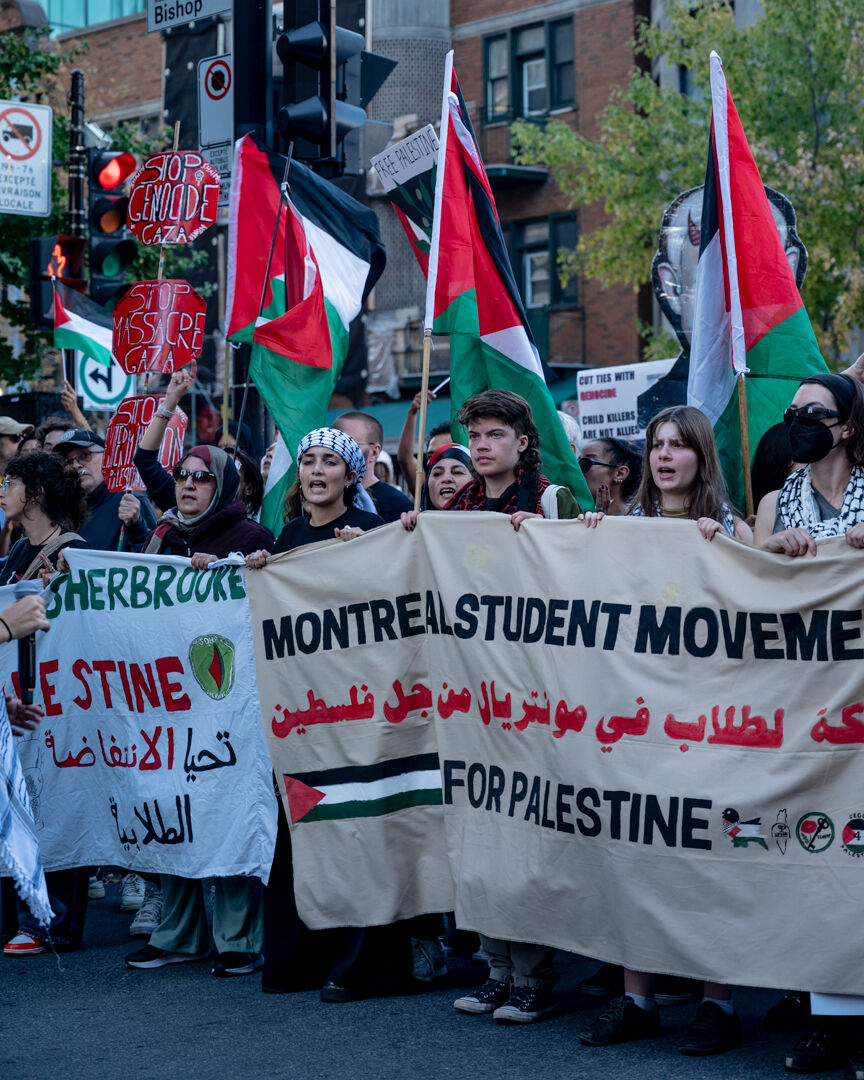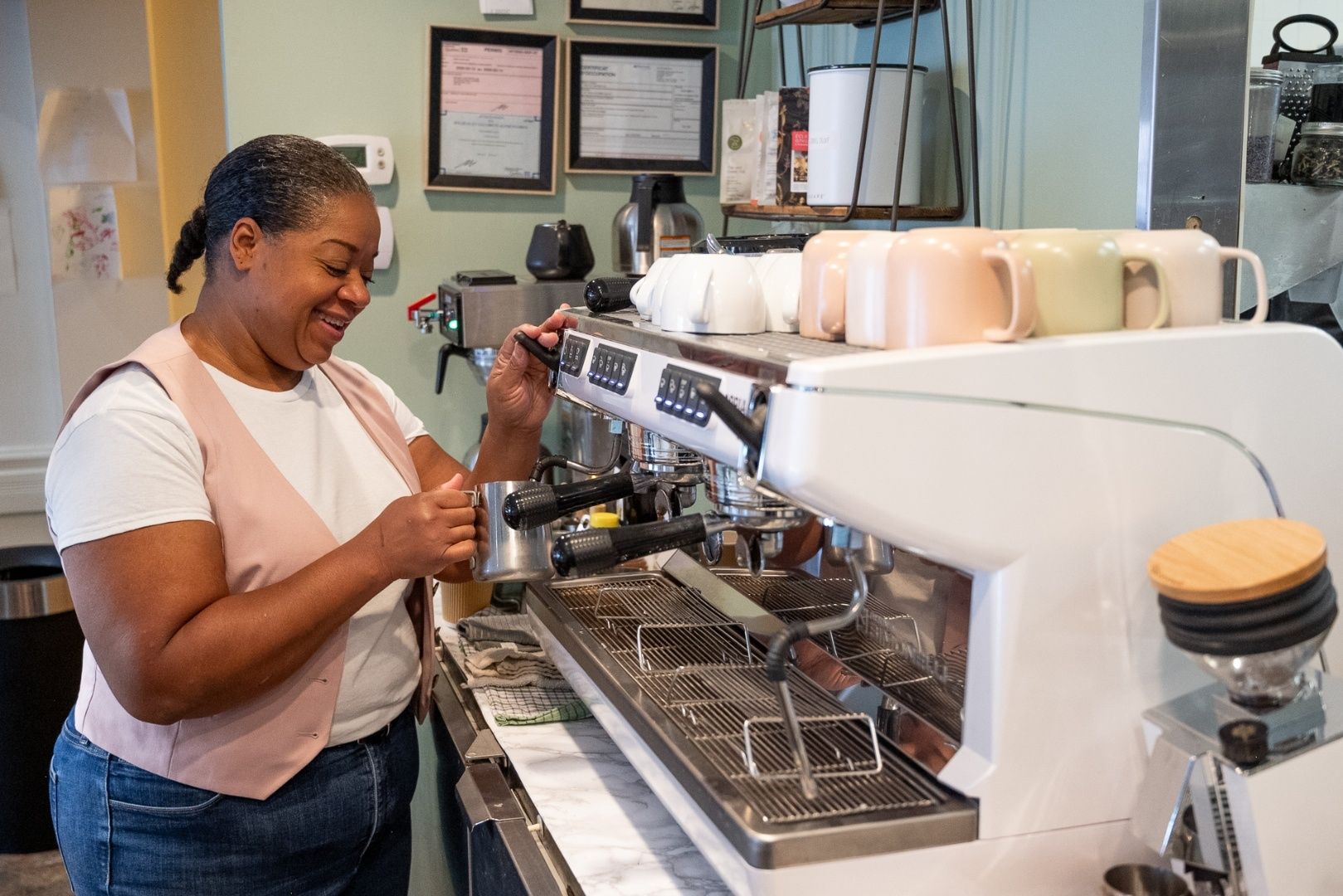In Laval, Saad Antar serves knafe with a glimpse into his hometown of Nablus, a city located in the occupied West Bank of Palestine. He takes us to Nablus by sharing staples about its heritage, as well as the brutal actions he witnessed the Israeli occupation commit against the Palestinian people.
His restaurant, Knafe Stop, sits on des Laurentides Boulevard, greeting visitors with the sweet aroma of pastry dough and syrup that blends with the slightly savory scent of cheese.
The interior is embellished with different map designs of Palestine, framed art pieces symbolic to the land, Palestinian flags, and a panoramic print of Al Aqsa Mosque, a holy sanctuary located in occupied East Jerusalem.
The entire ceiling is covered with Palestinian keffiyehs, which are intricately patterned traditional scarves that became a symbol of resistance for the people of Palestine.
These adornments are also accompanied by a TV that screens a 24/7 live stream of Nablus, showcasing its bustling streets, a testament to Antar’s fervent connection to his home. “At some point you’ll be able to see the neighborhood I used to live in,” he said.
Nablus is home to Palestinians whose passion for their culture enables an unwavering display of resilience in the face of the occupation, a system that poses a threat to their livelihoods on a daily basis. The passion and resilience embodied by the people of Nablus radiates through Antar’s presence at work.
He moves comfortably around the restaurant, always sporting a bright smile and welcoming people amiably. The topic of knafeh makes his eyes widen and his hands talk with him, communicating a dedicated ambition for his business. He further adopts an affectionate tone when reminiscing about Nablus, evoking a deep appreciation for his home.
Familiarizing Montrealers with the city of Nablus
Antar moved from Nablus to Montreal in 2010, when he was 19 years old. His father had already been living in Montreal since the year 2000. They had to wait 10 years until he received his permanent residence and finally became eligible to sponsor Antar and his brother.
Eager to retrieve the taste of his hometown’s signature dish, Antar began searching for a place that makes knafe in Montreal. “We grew up in Nablus, so we have to eat [knafe] every single day, maybe two times a day,” he said, amused. This dessert consists of pastry dough, layered with cheese and coated with syrup and pistachio crumbs.
However, Antar couldn’t find knafe that tasted the same as the one he grew up eating, which led him to make it his mission to bring the knafe from Nablus to Montreal. He went back to Nablus in 2013 to get a hold of the knafe recipe he was looking for. He ended up learning how to make the dish in a pastry shop called “Damascus’ Sweets.” “In the history books, Nablus was referred to as ‘Little Damascus’,” Antar explained animatedly.
Once he returned to Montreal, Antar busied himself with cooking the knafe at home and making deliveries on the weekend. He ran his business from home for about six years before opening his first location in Ville Saint-Laurent. Many customers had been encouraging him to open his own place. “They would tell me they want to come and have a cup of coffee with the knafe,” he said.
Antar’s first restaurant was small but attracted many customers. He recalls his first three years in the market being marked by ample support from the Arab community, as well as a large customer base from all over the world. “People began encouraging me to open bigger and more locations,” he said. Now Knafe Stop has three locations, including one in downtown Montreal.
After 15 years in Montreal, Antar’s love and attachment for his hometown never ceased. “All of Nablus is beautiful—its food, its streets, its people,” he said, pointing at the TV screen demonstrating Nablus’ lit-up streets as the night envelops the city.
He emphasized that while knafe is generally deemed a distinguished dessert by every Palestinian, it carries greater significance for Palestinians from Nablus, as the city is known for not only being the birthplace of the dish but also for being the best at making it. “Palestinians from other cities would always go to Nablus to get a taste of the knafe there. Especially in the city’s old town,” he said.
With his opening of Knafe Stop, Antar not only brought to Montreal the sweet and original taste of knafe, but also a warm piece of his childhood. “I come from Nablus, so I know how it should taste. I serve something that’s true to its roots,” he said. The restaurant’s authenticity is also mirrored through their use of ingredients imported from Palestine, such as the cheese and melted butter. The coffee they serve is from Palestine as well.
“Sometimes people come in just for the coffee,” Antar added.
Knafe Stop also offers Salam Cola as an alternative soft drink for Coca-Cola, answering the boycott calls for Palestine. “Anything that supports or funds the occupation, we boycott it. Boycotting is not hard. Anyone who feels strongly about it can find alternatives for what they need,” he said.
Life under occupation
Antar returns to Nablus every year, sometimes every five months. His trip to Palestine is a long one, filled with constraints. It starts with him going to Jordan and crossing the land borders. Once he gets to Palestine, he must deal with interrogations from Israeli authorities first and then Palestinian authorities before finally getting to his hometown.
Despite the charm Nablus radiates, Israeli occupation forces imposed conditions upon its Palestinian population that make it very difficult for them to sustain a decent life. There are checkpoints in every city located in the West Bank, which renders movement and access in that region very challenging. “You might be able to leave a place easily, but then something might happen on the way back. They might close the checkpoint and you won't be able to return,” Antar said.
The last time Antar went to Palestine was in January of this year. “I stayed two months in Nablus. I couldn't leave because the roads were very dangerous,” he said.
After Israel unleashed its bombing campaign on Gaza in October 2023, the occupation’s restraints on the West Bank increased in number and intensified in strictness. Antar mentioned that Nablus has become surrounded by 12 electric doors that can never be opened for Palestinians without permission from the occupation.
.png)
According to the United Nations Office for the Coordination of Humanitarian Affairs (OCHA), Israeli movement obstacles in the West Bank increased from 565 to 849, between October 2023 and March 2025. These obstacles include constantly staffed checkpoints, occasionally staffed checkpoints, roadblocks, earth mounds, road gates, earth walls, road barriers, and trenches.
The situation at the checkpoints is a suffocating one. Antar shared that the difficulties of getting through can depend on the mentality of the soldier on shift. Many would end up sleeping near the checkpoints because they couldn’t return home. During Ramadan, it gets even worse. The wait is prolonged, which forces people to break their fast there and have their suhoor there.
In addition, occupation forces made raids a daily occurrence. “People would be on the streets, shopping or going about their day, then suddenly, occupation soldiers would storm in, block the exits, destroy things, and assault them,” he said. It tends to get more violent and frequent in Ramadan as well.
“That’s besides settler violence, of course,” he added. Palestinians, including children, have become increasingly subjected to attacks and intimidation by Israeli settlers. “While you’re trying to get to another city, you might come across settlers trying to attack you at any moment. Either by throwing rocks at a car or surrounding it.”
According to the Palestinian Ministry of Health, more than 800 Palestinians in the West Bank have been killed by settlers and occupation forces since October 7.
Antar also remarked that the aggravation of the occupation’s control has caused a negative impact on the economy, as limitations on people’s movement rendered it nearly impossible to partake in trade activities.
However, he clarified that the difficulties they face in Nablus are not as intense as the ones Palestinians face in Gaza or other cities in the West Bank, such as Jenin. “This does not mean there are no problems. There’s actually a lot, but we say Alhamdulillah, it’s not as bad as other cities,” he said.
Hopes of return
The illegal Israeli occupation of the West Bank has been ongoing for more than 50 years. “It’s not a new phenomenon. We grew up facing these obstacles. It’s been happening since before we were even born,” said Antar. “But even in the face of this occupation, people are making the most out of what they can.”
Antar acknowledges that living conditions are safer in Canada. “Here you can move around freely, there is no one violating your space. Your kids can go to school and come back without the risk of someone getting in their way. That’s sadly how it is,” he said, a hint of bittersweetness in his tone.
Nevertheless, he believes he will get the chance to go back one day. “I won’t always stay here. I can’t leave my country. I can’t forget the place I grew up in, where my parents and friends live. It’s impossible. But for the most part, I’ll be in between Canada and Palestine,” Antar said.



.jpg)

.jpg)
.jpg)
